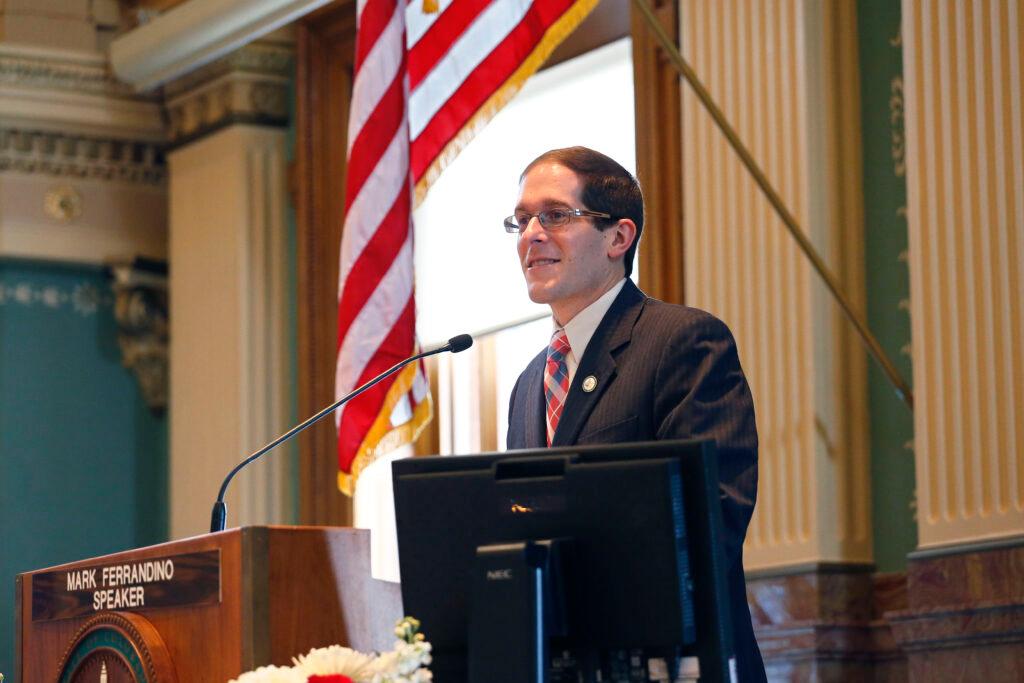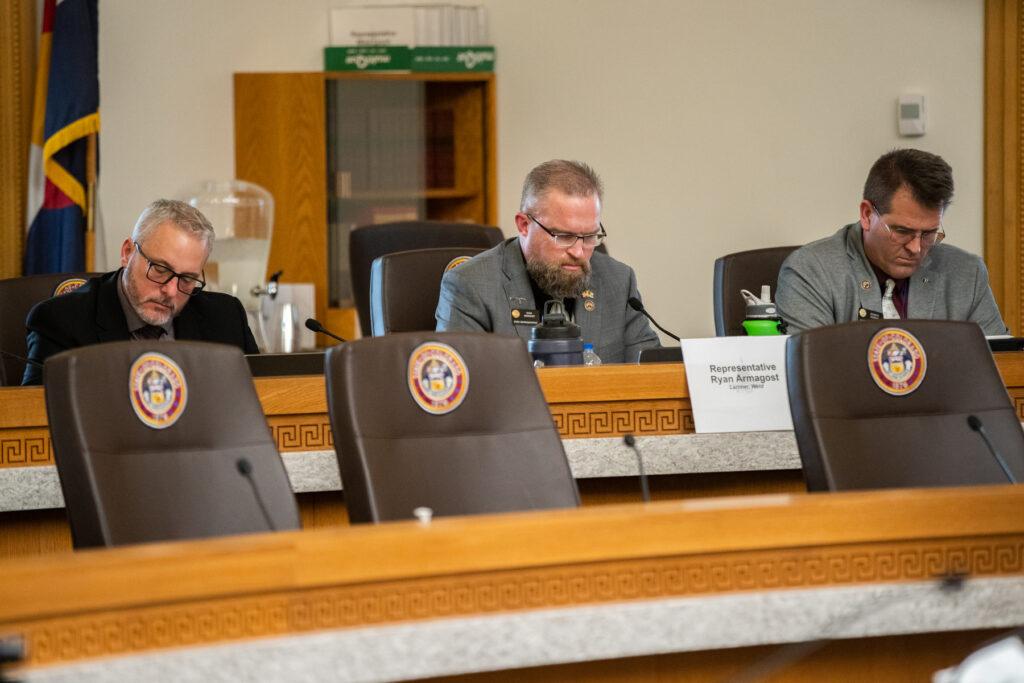
There’s a bit of an unspoken rhythm to the Colorado legislature: after lawmakers gavel in and get through all the big speeches and bill introductions, things get pretty quiet for a bit, before the session ramps up to full speed.
It’s not that nothing is happening at the Capitol. It’s that lawmakers spend the first week — or more — in what are called SMART Act hearings, sitting through presentations from all the various state departments and agencies their committees oversee.
The hearings are an effort to make government more accountable and transparent, but they take up precious time during the limited legislative session, and although most lawmakers in both parties say they support the overall effort, their views are more mixed when it comes to whether the hearings are effective, and they have plenty of ideas on how to improve the process.
“It's basically the departments telling us what they want us to hear,” said Democratic Sen. Dafna Michaelson Jenet of Commerce City. “We ask a lot of questions, and we don't always get the answers we're seeking. So I don't know how useful they are.”
Longmont Democratic Rep. Karen McCormick said the hearings can feel frustratingly performative, while Republican Rep. Ron Weinberg of Loveland was even more blunt.
“Every one I've heard in my first term, and now my second term, has been an absolute waste of time,” he complained.
But many lawmakers insist, when done right, the hearings can be a valuable tool to help them understand departments’ finances, dig into places for improvement and discuss how laws passed in recent years are being implemented.
“I think SMART Act hearings are incredibly important, especially for our new members, to understand some of the department priorities, where our fiscal priorities are, and to ask important questions that they're hearing from their constituents,” said Republican House Minority Leader Rose Pugliese of Colorado Springs.
The difference between a routine hearing — compared to a highly productive one — often comes down to how it’s structured and how much legislators themselves are prepared to put into it.
An effort to bring a bit of Budget Committee expertise to the rest of the legislature
Lawmakers passed the SMART Act in 2010, with bipartisan support. The acronym, borrowed from HR Departments and corporate annual reviews, stands for Specific, Measurable, Achievable, Relevant, and Time-bound — things well-planned goals should be. It was the brainchild of Mark Ferrandino, a former Democratic House member who sat on the legislature’s powerful Joint Budget Committee.
Ferrandino, who now serves as Governor Jared Polis’ budget director, told CPR News the genesis for the hearings was to preserve the JBC’s authority to write the annual budget bill. He said at the time, there was talk of doing away with the budget committee entirely and splitting up its work among other committees.
“I did not think, and other people did not think, that would make sense. We had a very good budget process,” said Ferrandino.

However, he did see room for improvement. He thought state finances could be more open and transparent to the rest of the legislature, and that the committee itself could be more deliberate.
“I think all of us on the Joint Budget Committee felt like we were making decisions in a very rapid way with not necessarily all the necessary information to make the best decision,” he said.
Ferrandino said he hoped the oversight hearings created by the SMART Act would get lawmakers outside of the budget committee more involved, and help state departments to focus on goals and outcomes, rather than budget changes.
House and Senate committees meet jointly for their SMART Act hearings to get presentations from their relevant departments. Education Committee members, for instance, hear from the departments of Education, Higher Education and Early Childhood, along with a multitude of presentations on various education funding issues. How long this lasts, and the time left for discussion once the presentations are over, is up to the lawmaker chairing the hearing.
The idea, explained Ferrandino, is “to try and shift committees from just bill committees to oversight committees. And I think that has worked some.”
Still, he believes things like term limits and the occasional politicization of hearings have made them less effective than they could be.
When lawmakers do their homework, hearings can quickly go from overview to indepth
For Berthoud Republican Rep. Ryan Armagost, the public nature of the SMART Act discussions is also important. The hearings happen in committee rooms open to the public and stream online on the state legislative website. There’s also time set aside for public testimony.
“I think that helps give the opportunity for legislators to let their constituents be aware of what the financial asks are, especially in a time where we're in nearly a billion-dollar deficit,” said Armagost.

Democratic Sen. Julie Gonzales of Denver leads the Senate Judiciary Committee and this year chaired the joint oversight hearings. She said she wanted to take a new approach.
Instead of coming armed with giant PowerPoint, she asked departments just to give brief overviews, leaving most of the time for questions. She also expected committee members to read all the reports and do their homework ahead of the hearing, and to let officials know in advance what they were going to want more information on.
That extra time allowed lawmakers to dig deeper and the departments to answer more thoroughly.
One issue committee members dove into was why it’s taking the Colorado Bureau of Investigation more than a year to process rape kits. Victims testified that the lack of DNA evidence delayed the finalization of police investigations, and meant in some cases suspects aren’t being arrested in a timely fashion.
“This is unconscionable that we are allowing these delays to continue to take place,” said Gonzales, reflecting on the hearing and the issues it highlighted. “And the very next day legislators were meeting with the department and with the governor's office in order to begin the work of addressing solutions.”
Gonzales said over the years there have been clashes with the Department of Corrections about budget requests, so this time she tried to bring different groups together to discuss various topics.
“It was actually really cool to be able to see the department offer their presentation and then for us to engage in dialogue and then immediately following to hear from incarcerated people, also members of the public on their perspectives as well,” she said.
She thinks the hearings will set the stage for better working relationships between the committee and the departments it oversees over the course of the legislative session.

Chair of the House Health and Human Services Committee, Rep. Kyle Brown of Louisville, is taking a similar approach to the hearings — trying to make them more about fact-finding than passive listening.
“I have really tried to make sure that our members are taking the SMART Act hearings very seriously, that we are putting together our concerns and questions in advance so that we can have meaningful dialog,” Brown said.
He’s using the Joint Budget Committee as a model for conducting productive SMART Act hearings.
“They compile questions, they have briefings, they push those out to the agencies, they get responses back, they have additional dialogue. We as other committees need to take that model and make sure that we are holding departments accountable,” he said.
As for Mark Ferrandino, he’s now been on all sides of the SMART Act, from creating it as a lawmaker to presenting in front of lawmakers as a member of the executive branch when he headed the Colorado Department of Revenue.
“All the department heads were like, ‘Well, this is all your fault and why we're doing this,’” he laughed. “They always rib me on that. But I do think the conversations were always meaningful.”
And despite their frustrations, lawmakers still see the hearings’ potential to be effective good governance tools, even if this accountability process might itself need a bit more accountability.
This story was produced by the Capitol News Alliance, a collaboration between KUNC News, Colorado Public Radio, Rocky Mountain PBS, and The Colorado Sun, and shared with Rocky Mountain Community Radio and other news organizations across the state. Funding for the Alliance is provided in part by the Corporation for Public Broadcasting.








